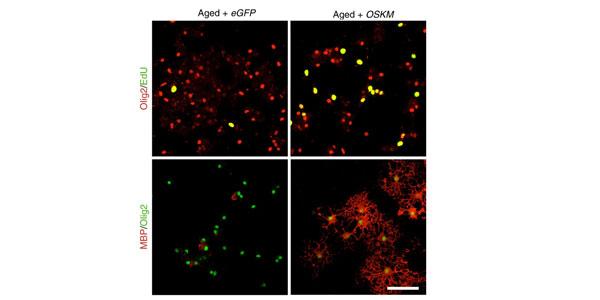
Submitted by J.M. Johnson on Tue, 21/09/2021 - 13:04
Scientists studying the condition multiple sclerosis (MS) have identified that a single gene, when manipulated, can make older brain stem cells behave like younger, more efficient cells.
The discovery could lead to new treatments that can repair myelin – the protective coating around nerves, which is damaged in people with MS. The study, published in the journal Nature Aging, looked at oligodendrocyte progenitor cells (OPCs). These cells are responsible for repairing myelin, but become less effective as a person ages, which leads to an irreversible progression of disability seen in some forms of MS.
Our researchers have been working alongside the MS Society Cambridge Centre for Myelin Repair at the University of Cambridge and have found that when they manipulated one gene – myc – in OPCs they were able to change the age state of the cell. Increasing the amount of myc in older OPCs saw them become more youthful and decreasing it in very young OPCs saw them resemble old cells. They also found they could reverse the ageing effects on the young cells by washing out the chemical that was lowering the amount of myc present.
Using state-of-the art gene editing techniques the research team then replicated these findings in aged mice and found increasing the level of myc in their OPCs was sufficient to result in enhanced remyelination. This finding is a significant step forward in understanding how ageing impacts the brain’s ability to repair myelin and offers an alternative route to improving the function of OPCs to enhance remyelination in people with MS.
Myc is one of a group of genes called the Yamanaka factors, which together, can reprogram any cell in the body to resemble the stem cells of very early development. The team are the first to show not only that the Yamanaka factors can be used to revert aged OPCs to a youthful state, but that it only takes a single one to do so, with corresponding improvements in myelin repair.
These latest findings add to research conducted by the team at Cambridge and published in 2019 in Cell Stem Cell, that strategies such as calorie restriction and fasting mimetics (drugs like the diabetes drug metformin which mimic the anti-aging impact of calorie-restricted diets) enhance remyelination in rats.
Professor Robin Franklin, Wellcome - MRC Cambridge Stem Cell Institute PI and senior author on the paper, said:
“The prospect of changing the age state of OPCs so they can regenerate throughout life is so much better than we’d have thought ten years ago. This is fantastic news for regenerative medicine and chronic demyelinating diseases like MS.”
Dr Björn Neumann who led both studies said:
“Strategies identified so far, including those based on whole-body physiology like fasting, change every cell involved in remyelination, not just OPCs. Now we know that you can target the OPC on its own and see an improvement in regeneration, albeit to a smaller degree compared to the whole-body treatments.
“This challenges the narrative that it’s not possible to improve the function of aged OPCs without direct manipulation of the aged environment. In fact, switching on myc gets you past the ‘bottleneck’ where aged OPCs are unable to successfully contribute to regeneration.”
Dr Clare Walton, Head of Research at the MS Society said:
“We are delighted to have funded this ground-breaking research. MS can be relentless, painful and disabling and we know people with MS urgently want us to find treatments that can protect and repair myelin. This latest discovery from Cambridge take us one step closer to that important goal.”
The team believe their results suggest it is a failure of the process that ‘wakes up’ OPCs from a resting state that prevents successful myelin repair - so the next stage of this research will see scientists look at whether these pathways could present a new drug target.
About multiple sclerosis
• Over 130,000 people live with multiple sclerosis (MS) in the UK
• MS damages nerves in your body and makes it harder to do everyday things, like walk, talk, eat and think
• It’s relentless, painful and disabling
• Research has got us to a critical point. We can see a future where nobody needs to worry about MS getting worse
• Our Stop MS Appeal needs to raise £100 million to find treatments for everyone with MS
About the MS Society
• The MS Society is here to make life better for people with MS, through research, campaigning and support
• For information about MS or to donate visit www.mssociety.org.uk

